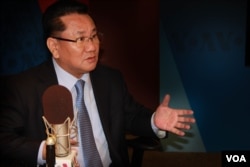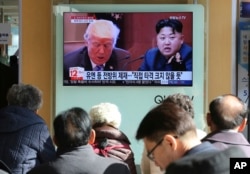A former North Korean economic official says Washington's recent decision to put Pyongyang back on the list of nations that sponsor terrorism is "a critical measure" that could cripple the country's economy, even though many experts are skeptical the move will force the DPRK to stop efforts to advance its nuclear weapons and missile programs.
Ri Jong Ho previously served in central agencies of the ruling Workers' Party of Korea, overseeing the country's overall production and trade. He previously worked in Office 39, a North Korean government branch that U.S. officials say "engages in illicit economic activities and managing slush funds and generating revenues for the leadership."
His last posting was in Dalian, China, as the head of the Korea Daehung Trading Corporation. Ri defected in late 2014 and now lives in the greater Washington, D.C., area.
President George W. Bush took North Korea off the terrorism list in 2008 in the hope of making progress on a deal limiting nuclear and missile developments, but the agreement fell apart within a year.
"In the eyes of North Korea, the terror-sponsor designation is a critical measure that would pose a grave threat to the regime," Ri told VOA Korean, "because it means the country will be treated at a level similar to international terrorists, which would undermine the leader's authority, further deepen its isolation and squeeze its economy."
Along with the stricter crackdown on North Korea's exports and the growing list of goods that cannot be sold to North Korea — including military supplies and "dual-use" items which have civilian and military applications — Pyongyang's imports of steel, electronic and rubber products could also be at stake, Ri said. A cutoff, or even a decline, in these goods — which cannot be produced domestically — would hurt North Korea's military, as well as its political leadership.
"If North Korea's imports of rubber goods become subject to sanctions, manufacturing activities that use rubber will come to a full stop," which would lead to a shortage of tires, Ri said. "They've experienced the situation in the past — in late '90s and early 2000s."
Trump-era sanctions
Ri noted that Trump-era sanctions leveled against the regime are "powerful and severe," and they are "fundamentally distinct" from previous North Korea sanctions in that they target all Pyongyang's possible sources of revenue.
"The past sanctions have mostly targeted specific individuals, companies and banks while leaving North Korea's revenue streams and its markets intact, so there were many loopholes and ways out," Ri said. "But now, with one sanctions regime, the U.S. can designate hundreds of North Korean companies and banks, in tandem with Chinese companies and banks that do business with the North."
With sanctions banning close to 150 North Korean ships from sailing and cutting large amounts of imported goods including oil supplies, Ri said in a year or two, the country may face another severe famine and financial crisis similar to that experienced in the mid-1990s. But this time, a crisis could come when North Korea's relations with China, its largest trading partner, are deteriorating.
"Beijing was never on board with sanctioning Pyongyang until today, which suggests that the China-North Korea relations are at an all-time low," Ri said. "And recently, China's envoy returned [to Beijing] without meeting Kim Jong Un, which is another sign that the relations have declined markedly."
Terror designation
Ri spoke as many North Korea experts cast doubt on the effectiveness of the U.S. re-designation of North Korea as a state sponsor of terror, asking if it would change North Korean behavior or pressure the regime to return to the negotiating table.
Andrew Yeo, a politics professor at Catholic University of America in Washington, said it's a symbolic move with little practical effects.
"Officially naming North Korea as a state sponsor of terrorism is more about further vilifying North Korea," Yeo said. "North Korea is already heavily sanctioned, so there are few practical implications at this point beyond making American businesses even more reluctant or wary of associating with North Korea."
In an apparent protest against the recent U.S. move, North Korea fired a ballistic missile early Wednesday local time, according to South Korea's Joint Chiefs of Staff.
VOA's Jenny Lee contributed to this report.


